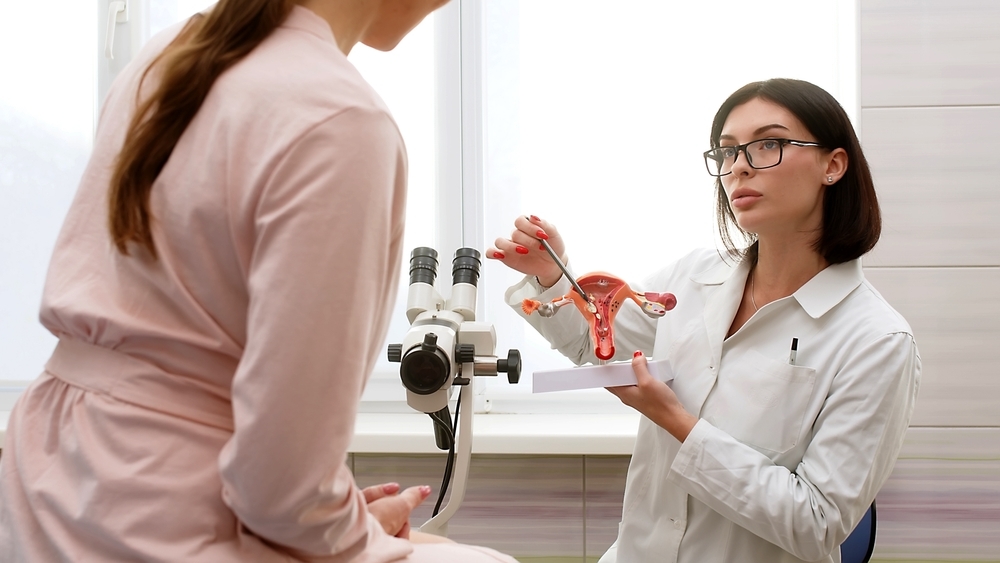
☝️ The most important facts in brief
- A gynaecologist is a specialist doctor who has completed a medical degree and comprehensive training in gynaecology and obstetrics.
- The specialist field of gynaecology covers a variety of diseases of the female reproductive organs. The gynaecologist also looks after pregnancies and carries out check-ups.
- As a gynaecologist, you are also the right contact for women when it comes to issues such as contraception, sexual health and family planning.
- Regular check-ups with a gynaecologist help to diagnose diseases at an early stage and thus to treat them with a significantly better prognosis.
📖 Table of contents
A gynaecologist, also known as a gynaecologist, is a specialist in gynaecology and obstetrics. This profession encompasses the care of women in all phases of life from the beginning of puberty. Gynaecological examinations, the treatment of diseases of the female reproductive organs and the monitoring of pregnancies through to birth are all part of a gynaecologist's everyday work. In this article, we explain the special features of this specialist field and show you how you can become a gynaecologist.
Are you interested in studying medicine?
We will be happy to advise you free of charge about your options for studying medicine, including advice on studying medicine in another EU country, which is fully recognised in Germany.
Becoming a gynaecologist - what is required to train as a gynaecologist?
In order to become a gynaecologist, you must first complete a degree in human medicine. This takes 6 years and is divided into the following 3 sections:
1) Preclinic
The pre-clinical phase comprises the first two years of medical studies. The focus here is on teaching the basics of anatomy, biology and physiology. Firstly, the general structure of the body is taught, which of course also includes the breasts, ovaries and other female reproductive organs and therefore forms the foundation for further studies and ultimately training to become a specialist in gynaecology and obstetrics.
2.) Clinic
The clinical phase of the medical degree programme is more practical than the pre-clinical part. Here you get a good overview of each individual speciality. Of course, this also includes gynaecology. If you wish, you can also complete an internship during this phase. Clinical traineeship in gynaecology and thus gain a good insight into various gynaecological topics.
3) Practical year
In the final year of your degree programme, you have to work for 16 weeks in one of three specialist areas. Surgery and internal medicine are compulsory, you can choose the third subject. If you already know at this point that you want to become a gynaecologist, it is of course advisable to choose gynaecology.
Specialist training is completed alongside work
Following your studies, you will then train as a specialist in gynaecology and obstetrics. This usually lasts 5 years and prepares you optimally for the various activities and tasks as a gynaecologist.
Unlike during your studies, you are now a registered doctor. You can therefore work in clinics and complete your training as a specialist alongside this work. Topics covered during specialist training include gynaecological emergencies, sexual and reproductive medicine, tumour diseases and their treatment and, of course, pregnancy.
Which areas belong to gynaecology?
Gynaecology is a very diverse specialist field. Gynaecologists look after women of all ages and carry out examinations, diagnoses, therapies and consultations relating to the female reproductive organs. The following sub-areas belong to the speciality of gynaecology and obstetrics:
General gynaecology: Here you will deal with tasks relating to the diagnosis and treatment of diseases of the female reproductive organs. This can be done in your own practice or in clinics.
Obstetrics: The care and monitoring of pregnancies and births as well as the postnatal period is another important task. You will often work closely with the midwives.

Reproductive medicine: If a woman needs support in treating fertility problems, she will usually visit a gynaecologist. You can then help to achieve the desired pregnancy.
Gynaecological Oncology: Unfortunately, the female reproductive organs are comparatively frequently affected by cancer. Therefore, the diagnosis and treatment of diseases such as breast cancer or cervical cancer are part of the duties of a gynaecologist.
Gynaecological endocrinology: Hormonal disorders affecting the reproductive organs are a common disease in the gynaecologist's field of work.
Urogynecology: Various diseases and disorders can occur in the female urinary tract. These include, for example, urinary tract infections, bladder weakness and incontinence. These problems increase with age in particular and require specialised monitoring.
Preventive medicine: The gynaecological examination and vaccinations carried out as part of preventive care can help to prevent some diseases, such as cervical cancer, or detect them early enough for them to be easily treatable.
Adolescent gynaecology: The examination and care of girls and young women in puberty and their support with contraception is a sub-area of gynaecology that requires special empathy.
Sexual medicine: Gynaecologists can advise on sexual dysfunctions. Depending on the type and cause of the disorder, successful treatment is often possible.
Postmenopausal medicine: Even after the menopause, it is important for a woman to receive expert care from a gynaecologist. In particular, patients need information, prevention and, if necessary, treatment for the cancers frequently found in gynaecology. With increasing age, regular examinations should therefore not be neglected under any circumstances.
Prevention plays a decisive role in gynaecology
In order to be able to recognise and treat serious illnesses at an early stage, regular visits to the gynaecologist with preventive examinations are important. For example, breast or cervical cancer can be treated with significantly better chances of recovery.
While as a gynaecologist working in a clinic you will have more to do with sick patients, your work as a gynaecologist in private practice will involve a lot more. Contact us with healthy patients. The aim is to provide them with preventive care so that diseases do not even have a chance to develop thanks to regular examinations. You are also the point of contact for all questions relating to contraceptive methods, family planning, pregnancy and menstruation.
Is every gynaecologist a Dr med?
A doctorate is generally not required for medical specialists. It also says nothing about the professional qualifications of gynaecologists, but shows that they have written a doctoral thesis that has stood up to rigorous scrutiny. The doctorate can be important if you want to work in science or teaching later on.
Many gynaecologists working in clinics also have a doctorate. It certainly doesn't hurt to start working towards one during or after your studies. However, this title, which is highly respected throughout the world, is not a must.
Specialisation in a particular field
Once you have passed the specialist examination, you have the opportunity to specialise further in a specific area of gynaecology. This essentially includes the following 3 areas:
Gynaecological oncology
This is a 24-month training course in which you will learn a lot about the different types of cancer in the gynaecological field. Many women are diagnosed with breast, cervical or ovarian cancer in the course of their lives. During your training, you will learn how to diagnose these diseases at an early stage through a gynaecological examination and how to treat them in the best possible way.
Specialised obstetrics and perinatal medicine
The term "perinatal medicine" covers the care of women from the 28th week of pregnancy until the 7th day after birth. You will primarily care for high-risk pregnancies and should be mentally resilient and able to concentrate in stressful situations.
Gynaecological endocrinology and reproductive medicine
This area of gynaecology deals with the diagnosis and treatment of hormonal disorders in women. Polycystic ovary syndrome, endometriosis and fertility problems are common problems that you will be consulted about here as a doctor. Thanks to modern science, it is now possible for many women to become pregnant despite medical obstacles.
What does a gynaecologist earn?
The salary of gynaecologists varies depending on professional experience, location and type of employment. In Germany, the salary at a clinic is around 6,000 to 8,000 euros, depending on professional experience and any additional qualifications.
Depending on the number of patients and range of services, gynaecologists in private practice can achieve significantly higher incomes. However, they also bear more risks and financial obligations than their colleagues working in clinics.
Free information material
Studying medicine abroad 🎉
Order your info pack now, find out more about the Studying medicine abroad and get started as a medical student!





